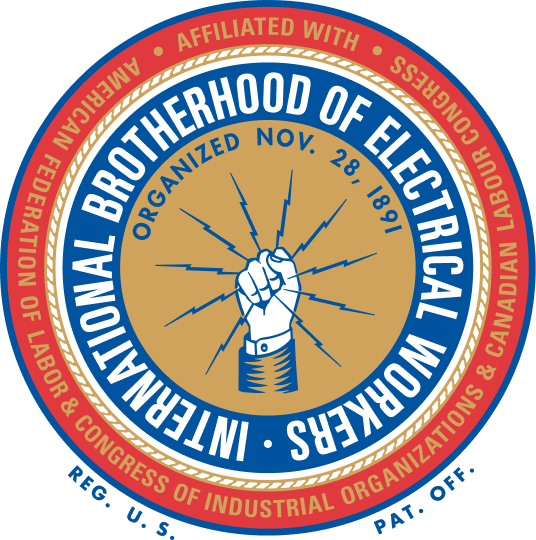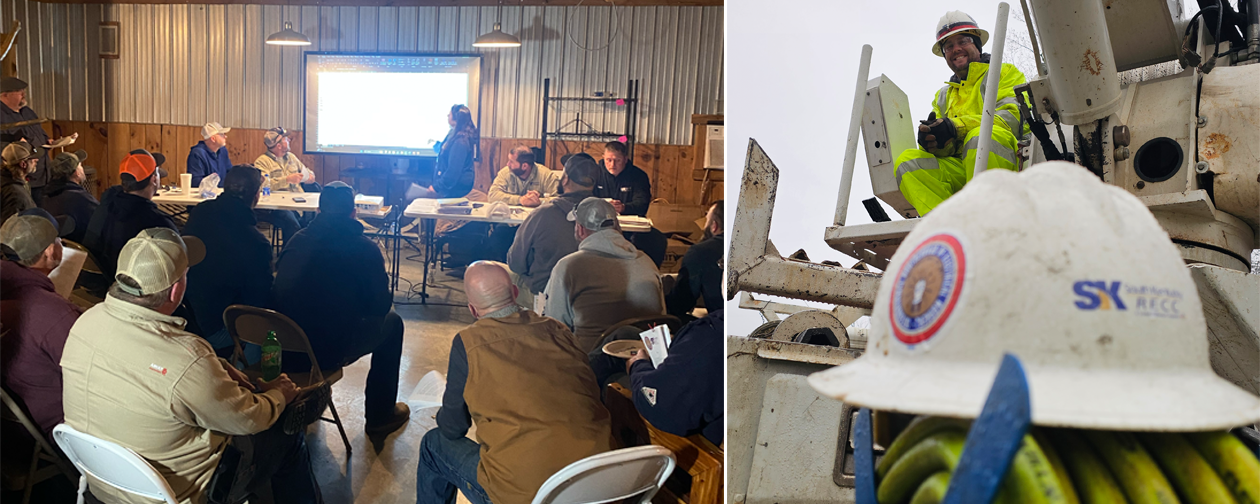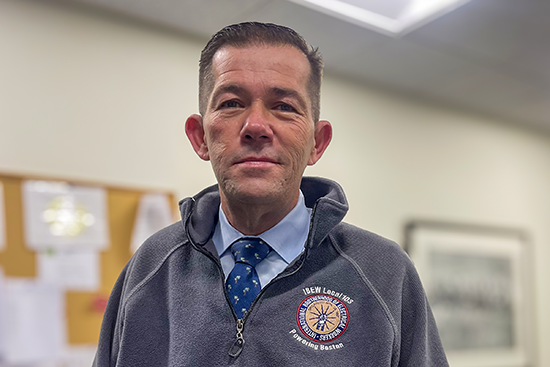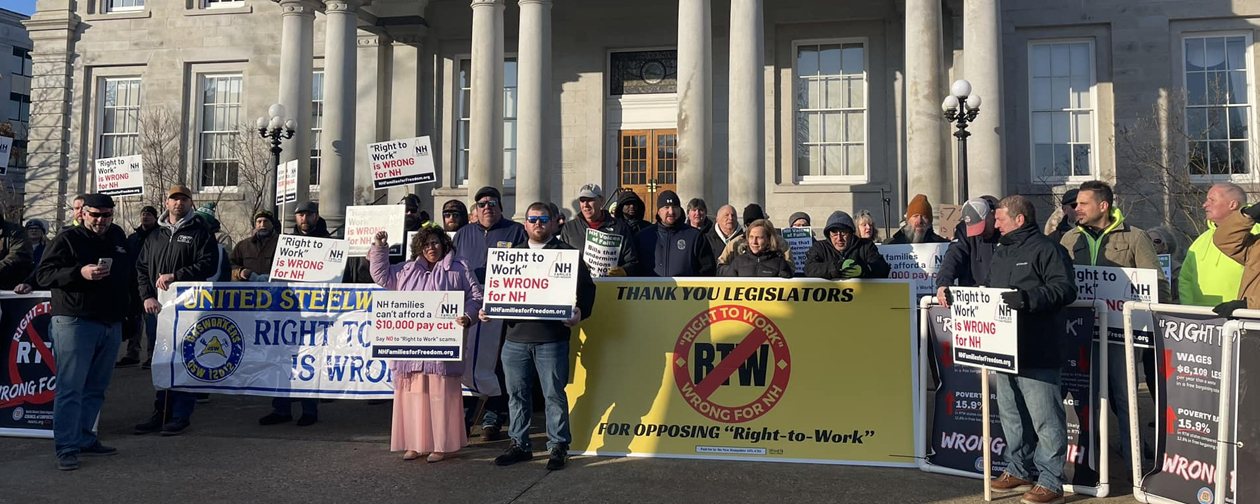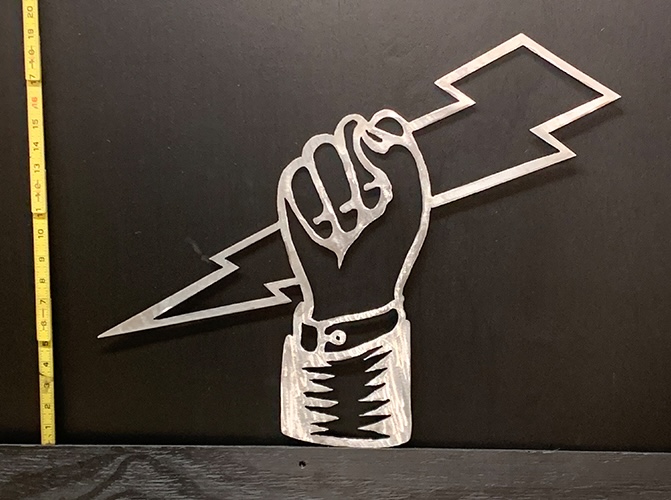Nearly a year and a half after they eagerly voted to join the IBEW, workers at South Kentucky Rural Electric Cooperative Corp. in December overwhelmingly approved their first contract with Louisville, Ky., Local 2100.
“This unit is just special,” said Alex Vibbert, Local 2100’s business manager. “They held on for the contract negotiations and showed up in droves to ratify their agreement.”
Vibbert said workers at the co-op, known commonly as SKRECC, voted to join the IBEW in July 2023. “But the company did not even come to the table for the first time until [that] December,” she said. “That was a very long year, but [the workers] held together and held steady.”
The co-op services 12 southern Kentucky counties along with two more in Tennessee. The workers’ multifaceted campaign to make a host of positive changes dates to 2016, Vibbert said.
“They were losing benefits, and they were seeing very negative changes in their leadership,” she said.
Fortunately, “linemen talk to linemen,” Vibbert said, and SKRECC’s workers began to realize how their benefits compared — and often differed — with those at other Kentucky co-ops, which are usually led by boards of trustees elected by their member-customers.
For SKRECC’s workers, theirs “wasn’t a co-op community anymore,” Vibbert said. “They’d become numbers” instead of people.
In traditional co-ops, “you would see somebody work their way up from being an apprentice to lineman to maybe a director of operations, then make their way up to a CEO,” said Fourth District Lead Organizer Andy Chapman. “They have a sense of pride because they work with a co-op owned by the members.”
But in recent years, Chapman said, many co-ops have been hiring CEOs from outside their organizations. “They don’t have that sense of pride because they’ve been hired from some other place,” he said.
This was the situation at SKRECC, and it motivated its workers, led by veteran linemen Jon Slavey and Derek Maurath, to band together and press for changes in the way things are run at the co-op.
“They were working as a union before they even formed their union,” Chapman said.
The SKRECC workers also contacted Local 2100 executive board member Benji Bohannon, who connected them with Chapman.
“Andy was honest with us and told us about the kind of stuff that the co-op would pull,” said Slavey, who’s been a lineman for nearly 28 years. “They’ve all got the same playbook.”
The workers persevered, and they were raring to organize with the IBEW when the vote was held in July 2023. “They marched in, one right after another” to cast their votes, Vibbert said. “It’s a moment I will never forget.”
It took another five months to convince SKRECC’s board to come to the bargaining table.
“They did not want the union in there,” said Fourth District International Representative Chad Douthat, who services Local 2100. The IBEW filed at least 30 unfair labor practice charges with the National Labor Relations Board, he said. “They refused to meet with us. They had intentions of fighting this tooth and nail.
“We kept it as friendly as we could,” he said, noting that the management side seemed unprepared for the negotiations, going so far as to replace their attorney at one point.
Despite the yearlong contract-talk slog, “it ended up working out pretty good,” Douthat said. “The workers were a pivotal point in the negotiations, too. This is an extremely strong unit, and they were very easy to work with.”
Maurath, who has been a lineman for more than 12 years, said, “We were just asking for industry-standard stuff.”
For Slavey, pensions were another big deal. “Some of us older ones were worried about the younger ones having the quality of life that we’ve had and the benefits we’ve had,” he said.
The contract was at last ratified in December by a 50-1 vote, and since then, applications for IBEW membership have continued to stream in. “That is amazing to me,” Vibbert said, considering that Kentucky is a so-called right-to-work state, where workers are legally allowed to opt out of paying union dues while still benefiting from collective bargaining agreements.
Vibbert and the others also credited this win to “Talk to Two,” Fourth District International Vice President Gina Cooper’s initiative that encourages IBEW members to speak about the union, every day, with at least two bargaining unit co-workers who haven’t joined or with workers in other, not-yet-represented departments.
“I’m bought in, 100%,” Slavey said of IBEW membership. “I’ve not seen any downside to it.”
Vibbert said her nearly 800-member local is showing even more signs of growth, thanks in part to workers at other Kentucky co-ops who have been watching the successful SKRECC campaign. The local also represents workers at utilities such as Shelby Energy Cooperative, Owen County Rural Electric Cooperative and Kentucky Utilities.
The business manager thanked the campaign’s organizing and negotiating teams for their “big family of support” in holding the new unit together.
“I am less than three years in as a business manager,” said Vibbert, a Local 2100 member since 2015. “I’ve never been through a campaign before, and this was the first time our local organized a new group since, I believe, the early 2000s.”
